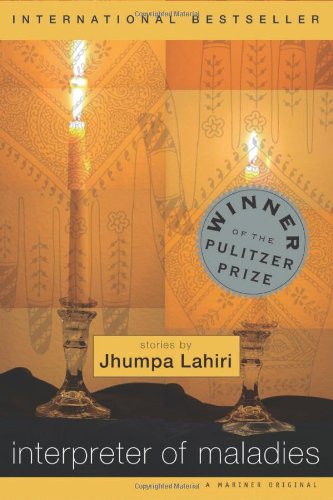All Nonfiction
- Bullying
- Books
- Academic
- Author Interviews
- Celebrity interviews
- College Articles
- College Essays
- Educator of the Year
- Heroes
- Interviews
- Memoir
- Personal Experience
- Sports
- Travel & Culture
All Opinions
- Bullying
- Current Events / Politics
- Discrimination
- Drugs / Alcohol / Smoking
- Entertainment / Celebrities
- Environment
- Love / Relationships
- Movies / Music / TV
- Pop Culture / Trends
- School / College
- Social Issues / Civics
- Spirituality / Religion
- Sports / Hobbies
All Hot Topics
- Bullying
- Community Service
- Environment
- Health
- Letters to the Editor
- Pride & Prejudice
- What Matters
- Back
Summer Guide
- Program Links
- Program Reviews
- Back
College Guide
- College Links
- College Reviews
- College Essays
- College Articles
- Back
Interpreter of Maladies by Jhumpa Lahiri
Jhumpa Lahiri’s collection of short stories, Interpreter of Maladies, focuses on the issues contemporary Indians face in today’s world as they adapt to life between cultures.
Bridging the gap between traditional Indian culture and that of the lands they have emigrated to, Lahiri follows the lives of immigrants as they adapt to life in the first-world, and their journeys returning as foreigners to the very land they once called their own.
“The family looked Indian but dressed as foreigners did, the children in stiff, brightly colored clothing and caps with translucent visors.” (p. 44)
As she explores the value of marriage and fidelity as a concept that differs in meaning in various regions of the world, Lahiri questions how a woman from a traditional Indian family knowing nothing other than the service of her husband, is permitted to react to his engagement in an extramarital relationship.
“He sat next to her on a plane, on a flight from Delhi to Montreal, and instead of flying home to his wife and son, he got off with the woman at Heathrow. … ‘Imagine. An English girl, half his age.’” (p. 83)
Lahiri’s frank discussion of taboo issues in the lives of men and women from strictly conservative backgrounds creates a striking contradiction within her prose which will compel you to question these characters’ obligations to a culture they know little of but are irreversibly tied to for eternity.
“‘That’s what my father did…He sat next to someone he didn’t know, someone sexy, and now he loves her instead of my mother.’” (p. 108)
Where does your loyalty lie — with your country, your family, or yourself? How, as a first or second generation American, can you be expected to live up to the expectations of a culture, a country, and a lifestyle completely foreign to you?
Interpreter of Maladies delves into the secrets, dreams, and realities of individuals facing the dilemma that is life between cultures.
Similar Articles
JOIN THE DISCUSSION
This article has 0 comments.

